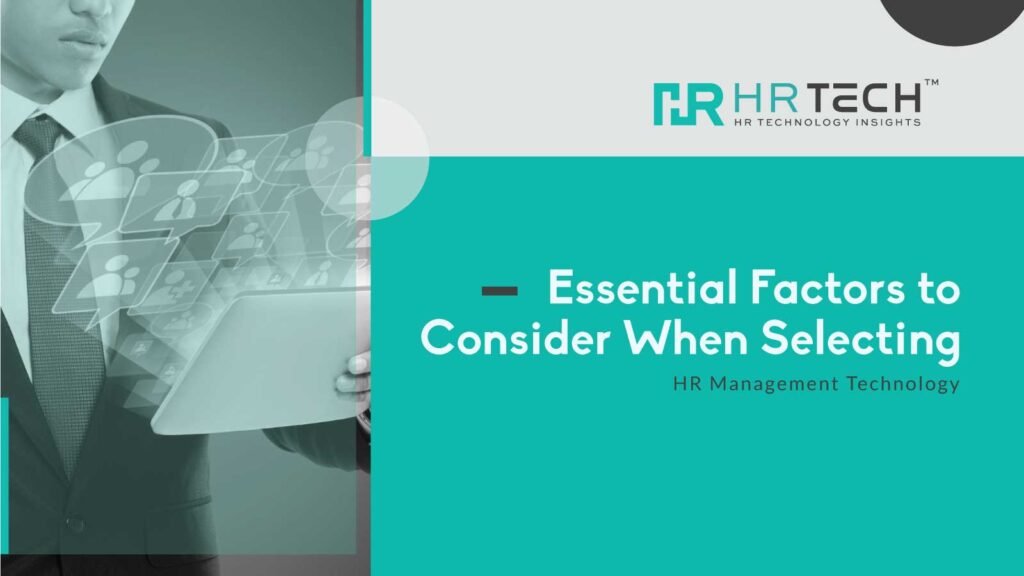Choosing Right HR Technology
Choosing the right HR management technology is one of the most impactful decisions a company can make in today’s fast-paced, data-driven business environment. The right HR solution not only streamlines administrative tasks but also drives greater employee engagement, boosts productivity, and supports strategic decision-making. However, with a vast array of options available, it’s essential to carefully evaluate the key factors that will align with your organization’s needs, culture, and growth trajectory. In this guide, we’ll explore four critical considerations—cost, scalability, data security, and customer support—that can help ensure you select the HR tech solution that best supports your workforce and long-term goals.
Key Considerations In Choosing Right HR Technology
- Budget Alignment or cost: Choose an HR management technology that fits your financial plan while offering the necessary tools to effectively manage HR functions, from recruitment to performance tracking.
- Scalability: As your business expands, so will your HR needs. It’s vital to select a solution that can grow with your organization and adapt to new challenges and processes as they arise.
- Data Protection: Safeguarding sensitive employee and organizational data is critical. Ensure the platform meets regulatory standards and includes advanced security measures like encryption, intrusion detection, and continuous updates to protect against threats.
- Customer Support: Opt for a provider that offers quick, accessible support across multiple channels—whether by phone, email, or live chat—and values feedback to resolve issues efficiently and keep systems running smoothly.
Factors Attempted to Explain:
Cost
When selecting HR technology, it’s essential to balance functionality with budget. While it can be tempting to opt for the most affordable solution, it’s important to ensure that the technology offers all the features your organization needs to manage HR tasks effectively. This includes tools for recruitment, employee management, payroll, benefits administration, and performance tracking. Consider the upfront cost and any ongoing fees, maintenance, or customization expenses that might arise.
Tip: Be sure to evaluate the ROI the technology provides, and ensure the investment supports both short-term goals and long-term growth.
Scalability
As your business grows, so will your HR needs. And, AI-powered HR technology solutions perfectly fit into the scalability strategies. Without AI, HR teams could potentially lose their viability in 2025. Therefore, it’s critical to choose a platform that can scale with your organization. Scalable HR technology can easily accommodate an expanding workforce, changing workflows, and evolving HR requirements, without needing a complete overhaul. Look for platforms that offer flexibility in adding new users, expanding functionality, and supporting more complex HR processes as your company develops. Adaptable HR Technology solutions allow you to avoid frequent system migrations and disruptions.
Tip: Choosing a scalable HR system ensures long-term sustainability and eliminates the risk of outgrowing the technology as your business expands.
Data Security
HR systems manage vast amounts of sensitive employee data, such as personal information, compensation details, and performance evaluations. Ensuring the security of this data is a top priority. When evaluating HR technology, ensure the solution adheres to industry-standard security protocols and complies with relevant regulations, such as GDPR, CCPA, or HIPAA. The platform should offer advanced features like encryption, two-factor authentication, and intrusion detection systems to prevent unauthorized access. Regular security updates and audits should also be a standard practice to ensure vulnerabilities are addressed promptly.
Tip: A strong focus on data security safeguards employee trust and organizational integrity. Ensure your HR management Technology stack meets all data privacy and governance norms.
Customer Support
Effective customer support is vital when implementing HR technology. A robust support system can make the difference between a smooth transition and costly disruptions. Look for a provider that offers multiple support channels, including phone, email, and live chat, to assist you whenever issues arise. It’s also important that the vendor is responsive and proactive in addressing concerns, especially during critical times like system implementation or troubleshooting. Additionally, ensure the provider values customer feedback and continuously improves their product based on user experiences.
Tip: Excellent customer support helps reduce downtime, ensures smooth operations, and builds long-term trust with the vendor.
Conclusion
In summary, selecting the right HR technology involves more than just finding a cost-effective solution—it’s about choosing a platform that can grow with your business, safeguard sensitive data, and provide ongoing support. Always consider factors such as scalability, security, and customer service, you can ensure that your HR technology meets your immediate needs and sets the foundation for long-term success.
A thoughtful approach to choosing HR tech empowers your organization to optimize HR processes, enhance the employee experience, and ultimately drive greater business outcomes.



